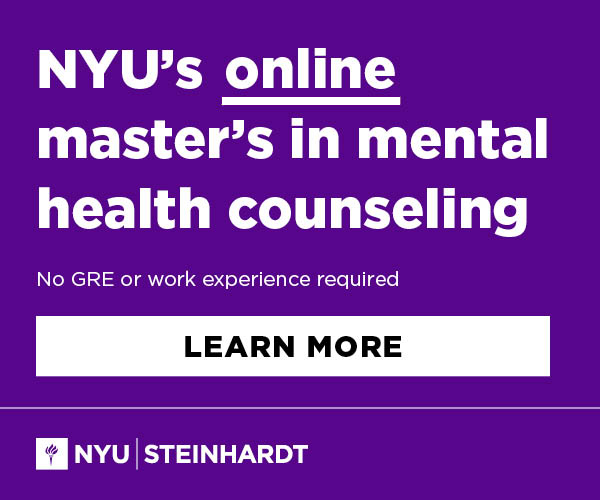 Northwestern University : Online MA in Counseling (CACREP Accredited)
Northwestern University : Online MA in Counseling (CACREP Accredited) Northwestern University : Master of Science in Marriage and Family Therapy (Complete your COAMFTE-accredited MFT online program in as few as 21 months. No GRE required.)
Northwestern University : Master of Science in Marriage and Family Therapy (Complete your COAMFTE-accredited MFT online program in as few as 21 months. No GRE required.) Walden University : MS in School Counseling (CACREP Accredited)
Walden University : MS in School Counseling (CACREP Accredited) Walden University : MS in Clinical Mental Health Counseling (CACREP Accredited, six specializations to choose from)
Walden University : MS in Clinical Mental Health Counseling (CACREP Accredited, six specializations to choose from) Grand Canyon University : Master's Degree in Counseling (As a private university, GCU has the same in-state and out-of-state tuition.)
Grand Canyon University : Master's Degree in Counseling (As a private university, GCU has the same in-state and out-of-state tuition.) Grand Canyon University : Degrees in Social Work (As a private university, GCU has the same in-state and out-of-state tuition. No GRE Required.)
Grand Canyon University : Degrees in Social Work (As a private university, GCU has the same in-state and out-of-state tuition. No GRE Required.) Syracuse University : Master of Social Work (CSWE accredited. Standard and Advanced Standing tracks. No GRE required.)
Syracuse University : Master of Social Work (CSWE accredited. Standard and Advanced Standing tracks. No GRE required.) Liberty University : MA: Clinical Mental Health Counseling (CACREP Accredited) (Online with required intensives)
Liberty University : MA: Clinical Mental Health Counseling (CACREP Accredited) (Online with required intensives) Liberty University : MSW: Social Work (100% online, 8-week courses)
Liberty University : MSW: Social Work (100% online, 8-week courses)Understanding MSW and Master's in Counseling Programs
Master of Social Work (MSW) Programs
Overview of MSW Programs
A Master of Social Work (MSW) program is designed to prepare students for advanced social work practice, focusing on both direct client services and macro-level practices such as policy development and advocacy. The curriculum typically includes coursework in social policy, human behavior, research methods, and ethics, along with extensive fieldwork to provide practical experience.
Typical Curriculum
MSW programs offer a blend of theoretical and practical education. Core courses often include:
- Human Behavior and the Social Environment: Examines theories of human development and behavior, focusing on individuals and families within their social contexts.
- Social Welfare Policy and Services: Explores the history, structure, and impact of social welfare policies and programs.
- Research Methods in Social Work: Introduces students to research design, data collection, and data analysis techniques.
- Clinical Social Work Practice: Covers methods and techniques for working directly with clients, including assessment, intervention, and evaluation.
MSW programs also require students to complete fieldwork or internships, where they gain hands-on experience under the supervision of licensed social workers. This practical component is crucial for developing the skills needed for effective social work practice.
Master's in Counseling Programs
Overview of Master's in Counseling Programs
A Master's in Counseling program focuses on preparing students to become licensed professional counselors (LPCs) who provide therapeutic services to individuals, families, and groups. The curriculum emphasizes counseling theories, ethics, and techniques, along with supervised clinical practice.
Typical Curriculum
The coursework for a Master's in Counseling program typically includes:
- Counseling Theories: Provides an overview of major counseling theories and their applications in practice.
- Ethics in Counseling: Covers ethical standards and legal issues relevant to the counseling profession.
- Counseling Techniques: Teaches practical skills for conducting counseling sessions, including communication, assessment, and intervention strategies.
- Group Counseling: Focuses on the dynamics and techniques of counseling groups.
In addition to coursework, Master's in Counseling programs require students to complete supervised clinical hours. This experience is essential for meeting licensure requirements and developing practical counseling skills.
Key Differences Between MSW and Master's in Counseling Programs
Curriculum Differences
The primary difference between MSW and Master's in Counseling programs lies in their focus. MSW programs offer a broader scope, covering both direct practice with clients and macro-level work such as policy analysis and community organizing. In contrast, Master's in Counseling programs concentrate on developing therapeutic skills for working directly with clients.
Career Path Differences
Graduates of MSW programs can pursue a variety of roles, including clinical social worker, community service manager, and policy advocate. They often work in settings such as social service agencies, healthcare facilities, and non-profit organizations. In contrast, graduates of Master's in Counseling programs typically become licensed counselors, working in private practice, schools, and mental health clinics.
Tips for Choosing Between MSW and Master's in Counseling Programs
General Considerations for All Programs
When selecting a program, it's crucial to consider accreditation. Ensure that the program is accredited by a recognized body, such as the Council on Social Work Education (CSWE) for MSW programs or the Council for Accreditation of Counseling and Related Educational Programs (CACREP) for counseling programs. Accreditation ensures that the program meets high standards of quality and is recognized by employers and licensing boards.
Making a Choice Based on Interests and Career Aspirations
Choosing between an MSW and a Master's in Counseling depends on your career goals and interests. If you're passionate about social justice, policy advocacy, and community work, an MSW program might be the right fit. On the other hand, if you're interested in providing therapeutic services and working directly with clients in a counseling role, a Master's in Counseling program would be more suitable.
Consider a Featured Online Counseling Program
| School and Program Information | Online Program? Entry Requirements |
Course Information |
|---|---|---|
| Northwestern University
Online MA in Counseling
 CACREP Accredited CACREP Accredited |
✔ Online
GRE Not Required Bachelor's Required |
Prepare to pursue licensure in as few as 18 months Learn MoreFull-time, part-time, and accelerated track options available |
| Northwestern University
Master of Science in Marriage and Family Therapy
COAMFTE Accredited |
✔ Online
GRE Not Required Bachelor's Required |
The COAMFTE-accredited MFT@Northwestern is offered by The Family Institute at Northwestern University. Full-time students can complete the program in as few as 21 months. No GRE is required, but applicants must hold an undergraduate degree. Full and part-time tracks available. Learn More |
| Walden University
MS in School Counseling
 CACREP Accredited CACREP Accredited |
✔ Online
GRE scores not required |
School counselors help students overcome obstacles and shape successful futures. Walden’s online MS in School Counseling program will give you a solid foundation in school counseling theories, approaches, and best practices while enabling you to gain hands-on experience. Learn More |
| Walden University
MS in Clinical Mental Health Counseling
 CACREP Accredited CACREP Accredited |
✔ Online
GRE scores not required |
Mental health counselors play a valuable role in helping people cope with life’s challenges. Walden’s online MS in Clinical Mental Health Counseling program can help you become the competent, compassionate counselor you know you can be. Learn More |
| Grand Canyon University
Master's Degree in Counseling
HLC and NASAC Accredited |
✔ Online
|
Clinical Mental Health Counseling master's degree emphases include: Childhood and Adolescence Disorders, Christian Counseling, Marriage and Family Therapy, and Trauma. Designed to meet the academic requirements of the National Board for Certified Counselors for the National Certified Counselor credential, the Certified Clinical Mental Health Counselor credential and the Arizona Board of Behavioral Health Examiners. As a private university, GCU has the same in-state and out-of-state tuition. Learn More |
| Grand Canyon University
Degrees in Social Work
Bachelors and Masters |
✔ Online
No GRE Required |
Grand Canyon University now offers undergraduate and graduate degree programs that are suited to a future career in social work. You can apply to the Bachelor of Social Work degree program or several graduate programs such as the Master of Social Work program to further your education. Currently in Candidacy status with the Council on Social Work Education. Learn More |
| Syracuse University
Master of Social Work
CSWE accredited |
✔ Online
No GRE Required |
Syracuse University’s CSWE-accredited online Master of Social Work program is preparing the next generation of social work leaders through an emphasis on digital innovation and social justice. Learn More |
| Liberty University
MA: Clinical Mental Health Counseling (CACREP Accredited)
 CACREP Accredited CACREP Accredited |
✔ Online
Online with required intensives |
Our CACREP-accredited master’s in counseling degree online can help you become an ethical, well-trained mental health counselor with the knowledge, values, and skills you need to empower others to make positive changes in their lives. Online and on campus. Training Champions for Christ since 1971. Learn More |
| Liberty University
MSW: Social Work
SACSCOC |
✔ Online
100% online, 8-week courses |
This program offers a general cognate and an individual and family clinical cognate. No matter which option you choose, you’ll receive advanced generalist training in social policy, research, and practice — as well as the opportunity to apply what you’ve learned in your field. Online and on campus. Training Champions for Christ since 1971. Learn More |
*Sponsored Counseling Programs
Online CACREP Accredited programs | Online MPCAC Accredited programs
 Northwestern University - Online MA in Counseling (CACREP Accredited)
Northwestern University - Online MA in Counseling (CACREP Accredited)
 Northwestern University - Master of Science in Marriage and Family Therapy (COAMFTE Accredited)
Northwestern University - Master of Science in Marriage and Family Therapy (COAMFTE Accredited)
 Walden University - MS in School Counseling (CACREP Accredited)
Walden University - MS in School Counseling (CACREP Accredited)
 Walden University - MS in Clinical Mental Health Counseling (CACREP Accredited)
Walden University - MS in Clinical Mental Health Counseling (CACREP Accredited)
 Grand Canyon University - Master's Degree in Counseling (NASAC Accredited)
Grand Canyon University - Master's Degree in Counseling (NASAC Accredited)
 Grand Canyon University - Degrees in Social Work (NASAC Accredited)
Grand Canyon University - Degrees in Social Work (NASAC Accredited)
 Syracuse University - Master of Social Work (CSWE Accredited)
Syracuse University - Master of Social Work (CSWE Accredited)
 Liberty University - MA: Clinical Mental Health Counseling (CACREP Accredited) (CACREP Accredited)
Liberty University - MA: Clinical Mental Health Counseling (CACREP Accredited) (CACREP Accredited)
 Liberty University - MSW: Social Work (SACSCOC Accredited)
Liberty University - MSW: Social Work (SACSCOC Accredited)
Job Roles Available to MSW and Master’s in Counseling Graduates
MSW Graduate Roles
Graduates with a Master of Social Work (MSW) degree have a variety of career options in different sectors, focusing on both clinical and macro-level social work practices. Here are some common job roles for MSW graduates:
Clinical Social Worker
- Role: Provide therapy and counseling services to individuals, families, and groups. They address mental health issues, substance abuse, and emotional problems.
- Work Settings: Hospitals, private practices, mental health clinics, and community health organizations.
- Licensure: Typically requires becoming a licensed clinical social worker (LCSW), which involves additional supervised clinical experience and passing a state licensing exam.
Community Service Manager
- Role: Oversee programs that support public well-being, such as health initiatives, housing projects, and community development efforts. They plan, direct, and coordinate activities to improve social services and public health.
- Work Settings: Non-profit organizations, government agencies, and community centers.
Policy Advocate
- Role: Work on policy development and advocacy to address social issues at the local, state, or national level. They research, analyze, and advocate for policies that promote social justice and equity.
- Work Settings: Advocacy organizations, government agencies, research institutions, and non-profits.
Master’s in Counseling Graduate Roles
Graduates with a Master’s in Counseling degree typically pursue careers that involve providing therapeutic services and support to individuals and groups. Here are some common job roles for Master’s in Counseling graduates:
Licensed Professional Counselor (LPC)
- Role: Provide mental health counseling to individuals, couples, families, and groups. They help clients manage and overcome mental health issues, emotional challenges, and relationship problems.
- Work Settings: Private practices, mental health clinics, hospitals, schools, and community health centers.
- Licensure: Requires becoming a licensed professional counselor (LPC), which involves completing supervised clinical hours and passing a state licensing exam. Many online master’s programs in counseling, including online master’s in counseling with no GRE required, prepare students for this licensure.
School Counselor
- Role: Work with students in educational settings to provide academic, career, and personal/social counseling. They help students develop academic plans, explore career options, and address social and emotional issues.
- Work Settings: Elementary schools, middle schools, high schools, and colleges.
Marriage and Family Therapist (MFT)
- Role: Provide therapy to individuals, couples, and families, focusing on improving relationships and resolving interpersonal conflicts. They address issues such as marital problems, parent-child conflicts, and family dynamics.
- Work Settings: Private practices, mental health clinics, family service agencies, and healthcare facilities.
Choosing the Right Path
When deciding between an MSW and a Master’s in Counseling, consider your career interests and the type of work environment you prefer. If you are passionate about social justice, community work, and policy advocacy, an MSW might be the best fit. If you prefer working directly with clients to provide therapeutic services, a Master’s in Counseling could be the right choice.
For more information on how to become a licensed clinical social worker or to explore LCSW online programs, consider programs that align with your career goals and offer the necessary support and accreditation.
Job Outlook and Salary for LMHCs and LCSWs
Licensed Mental Health Counselors (LMHCs) play a critical role in providing mental health services to individuals, families, and groups. They work in various settings, including private practices, mental health clinics, hospitals, and schools.
Job Outlook: According to the U.S. Bureau of Labor Statistics (BLS), employment for mental health counselors is projected to grow 18% from 2022 to 2032, much faster than the average for all occupations. This growth is driven by increased awareness of mental health issues and a growing demand for mental health services.
Salary: The median annual wage for mental health counselors was $53,710 in May 2023, according to the BLS. Salaries can vary widely based on factors such as location, level of experience, and the specific setting in which they work. For example, those working in government positions or large healthcare facilities may earn more than those in private practice.
Job Outlook and Salary for Licensed Clinical Social Workers (LCSWs)
Licensed Clinical Social Workers (LCSWs) provide essential services to help individuals cope with and overcome various challenges in their lives, including mental health issues, substance abuse, and family problems. They are employed in diverse environments such as hospitals, private practices, community agencies, and schools.
Job Outlook: The BLS projects a 7% growth rate for social workers from 2022 to 2032, which is faster than the average for all occupations. This increase is largely due to the ongoing need for social services and healthcare, particularly as the population ages and requires more support.
Salary: The median annual wage for social workers was $58,380 in May 2023, according to the BLS. Like LMHCs, the salaries of LCSWs can vary significantly based on factors like geographical location, experience, and the work environment. LCSWs in clinical settings or those working in urban areas tend to earn higher wages compared to those in rural or non-clinical settings.
| Job Growth 2022-2032 | Approximate Annual Wage Range | |
| Mental Health Counselors | 18% | $37K – $90K |
| Social Workers | 7% | $38K – $95K |
Sources:
BLS, Substance Abuse, Behavioral Disorder, and Mental Health Counselors
BLS, Social Workers
Frequently Asked Questions
What Can I Do with an MSW vs. a Master’s in Counseling?
MSW Careers:
- Clinical Social Worker: Provides therapy and counseling to individuals and families, often working in hospitals, private practices, and mental health clinics.
- Community Service Manager: Oversees social service programs and manages staff in non-profit organizations, government agencies, and community centers.
- Policy Advocate: Works on developing and promoting policies to address social issues, employed by advocacy organizations and government agencies.
Master’s in Counseling Careers:
- Licensed Professional Counselor (LPC): Offers mental health counseling in private practice, schools, hospitals, and community health centers.
- School Counselor: Provides academic, career, and personal/social counseling to students in educational settings.
- Marriage and Family Therapist (MFT): Offers therapy to individuals, couples, and families to improve relationships, often working in private practices and mental health clinics.
How Long Does It Take to Complete Each Program?
MSW Programs:
- Typically takes about 2 years of full-time study.
- Some accelerated programs can be completed in as little as 1 year for students with advanced standing.
Master’s in Counseling Programs:
- Generally takes 2 to 3 years of full-time study.
- Accelerated programs and part-time options are available, which can affect the duration.
Are There Online Options for MSW and Master’s in Counseling Programs?
Online MSW Programs:
- Yes, many universities offer CSWE accredited online MSW programs, providing flexibility for working professionals.
Online Master’s in Counseling Programs:
- Yes, there are numerous CACREP accredited online counseling programs available, some of which may have no GRE requirements for admission.
What Are the Licensure Requirements for Each Degree?
MSW Licensure:
- To become a licensed clinical social worker (LCSW), graduates must complete supervised clinical hours and pass a state licensing exam. For more details, see how to become a licensed clinical social worker.
Counseling Licensure:
- To become a licensed professional counselor (LPC), graduates must complete supervised clinical hours and pass a state licensing exam. Specific requirements vary by state and program.
What Factors Should I Consider When Choosing Between an MSW and a Master’s in Counseling?
Personal Interests:
- If you are passionate about social justice, policy advocacy, and community work, an MSW may be more suitable.
- If you prefer providing therapeutic services and working directly with clients in a counseling role, a Master’s in Counseling might be the better choice.
Career Goals:
- Consider the types of roles and settings you envision for your career.
- Evaluate the job outlook and salary potential for each path to ensure it aligns with your financial and professional aspirations.
By understanding these frequently asked questions, prospective students can gain valuable insights into the differences between MSW and Master’s in Counseling programs, helping them make informed decisions about their education and career paths.
Taking the Next Step
Both MSW and Master’s in Counseling degrees offer rewarding career opportunities for those passionate about helping others. By thoroughly researching and selecting a program that fits your professional goals, you can embark on a fulfilling career dedicated to making a difference in the lives of individuals and communities.
Remember to consider factors such as accreditation, program format, and your personal interests when making your decision. This careful consideration will ensure that you choose the path that best aligns with your aspirations and sets you up for long-term success in the field of social work or counseling.



















